Faith Matters: ‘A place where there is no man’: A call to realize that we are the ones we have been waiting for
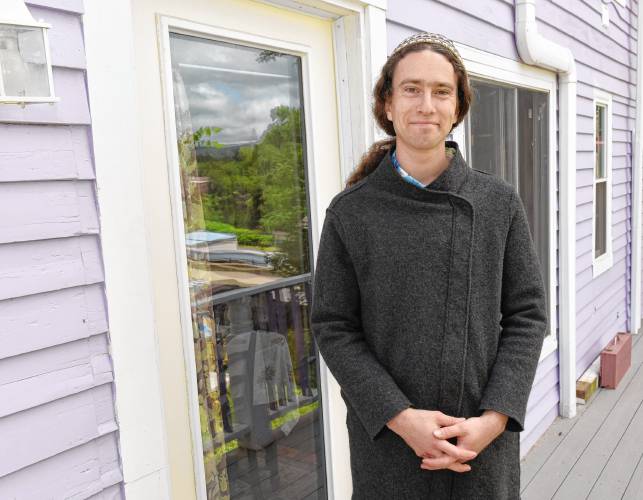
Jasper Lapienski is the founder and president of the Greenfield Orthodox Coalition, a Jewish community group inspired by the wisdom of the Lubavitcher Rebbe. STAFF PHOTO/PAUL FRANZ
| Published: 04-05-2024 1:30 PM |
“In a place where there is no man, strive to be a man.” (Avot 2:6)
If you take just the second half of this statement, it sounds uncomfortably familiar: Be a man. We hear that a lot these days. Real men don’t cry; be a man. Shoulder the burden. Do your boss’s dirty work. Fight (physically) for your place in a meaningless hierarchy.
But what if that phrase was culturally appropriated from an ancient Jewish text? What if it were really meant as a timeless directive to the pious? And intended for women and children as well?
“Pirkey Avot (The Ethics of our Fathers)” is a book of the Mishnah, one of the oldest Jewish texts, which we believe was given orally to Moses at Mount Sinai and then handed down from generation to generation by Jewish leaders until it was eventually transcribed.
The phrase I opened with is in the middle of chapter two, appended almost as if it were a throw-away line to the end of the paragraph.
Yet it is also one of those lines that sticks in your head and travels with you on your journey, reminding you to care, pushing you to be better. “In a place where there is no man...”
I often have difficulty with old-timey language because it defaults to the masculine even when it is clearly intended for everyone. It could, perhaps, be re-worked into modern parlance to be more inclusive, something like: “In a place where there is no one, strive to be someone.” For this piece, I have chosen to keep the original with that asterisk.
I lost interest in politics years ago, but when I formally moved to Greenfield in 2021, I went to City Hall to ask who was running for the council. No one had signed up, they said.
Article continues after...
Yesterday's Most Read Articles
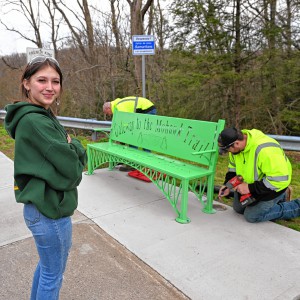 Franklin Tech student welds artistic bench for French King Bridge
Franklin Tech student welds artistic bench for French King Bridge
 On The Ridge with Joe Judd: What time should you turkey hunt?
On The Ridge with Joe Judd: What time should you turkey hunt?
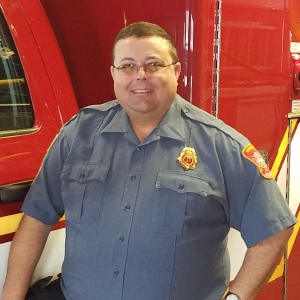 State records show Northfield EMS chief’s paramedic license suspended over failure to transport infant
State records show Northfield EMS chief’s paramedic license suspended over failure to transport infant
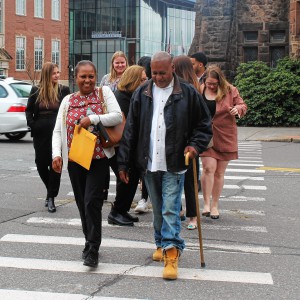 Former Greenfield man granted new trial after 1995 murder conviction, walks free
Former Greenfield man granted new trial after 1995 murder conviction, walks free
 Police report details grisly crime scene in Greenfield
Police report details grisly crime scene in Greenfield
 Formed 25,000 years ago, Millers River a historic ‘jewel’
Formed 25,000 years ago, Millers River a historic ‘jewel’
In a place where there was no man, I registered to vote and signed up to stand for office.
In January 2023, I was chatting with my roommate about our desire to study Jewish mysticism (Kabbalah). In a place where there was no class, I called a rabbi and we started a class that Sunday.
In August 2023, Rabbi asked me why there was no public Chanukah menorah in Greenfield, when most other towns have one. In a city where there were no lights, I built the menorah and the rest is history.
I have rarely seen Greenfield so proud, so united, as on the night of our Chanukah ceremony Dec. 13th. Around 70 people from all faiths joined us and everyone I know has been warmed and inspired by what we accomplished.
“Whether you like it or not,” my friend Dan told me New Year’s Eve, “you are the leader of the Jewish community in Greenfield.”
I said that I didn’t want to be a community or faith leader, but I knew Dan was speaking the truth. The need was there, the community clearly wanted to engage with our traditions, and no one else was stepping up to the plate – and so, in a place where there was no man, I founded the Greenfield Orthodox Coalition.
Our first event under this banner was two weeks ago, on the holiday of Purim. We had the first Orthodox prayer service in Greenfield in at least a decade, a full reading of the Book of Esther, a juggling show, a guest speaker from Papua New Guinea, and bagels & lox – in my living room.
In a place where there was no minyan (Orthodox quorum of 10), we made history with a quorum of 17, two of whom were praying for the first time in their lives at ages 58 and 70.
The famous book “Hitchhiker’s Guide to the Galaxy” gives us the opposite of Avot 2:6 – the concept of Somebody Else’s Problem. To make something invisible, you cast a spell upon it that causes all who would notice it to believe that it is Somebody Else’s Problem – hence, no one can see it.
In casual conversation we use the word “they” a lot, referring to things that are Somebody Else’s Problem. Potholes? They should fix them. Homelessness? They should build more affordable homes. Climate change? They should make companies stop polluting.
My hero in Judaism, the role model for the ages, is Rabbi Yaakov Yehudah “J.J.” Hecht. His take on life was that “If you see something that needs doing, [therefore] you have an obligation to go about doing it.”
There was no they in J.J.’s world; nothing was ever Somebody Else’s Problem. Whatever you needed and whoever you were, J.J. would find a way to help you, no matter what. J.J. Hecht truly lived out Ghandi’s imperative to “be the change you wish to see in the world,” to take upon himself the thing that needed doing — in short, to be a man.
This, truly, is the call for our time: to recognize that there is no they; that no one is coming to save us; that we are the ones we have been waiting for. And that the time is right — right now — for you, and you, and you (and I) to step into the place in which there is no man (or person), and be a man.
Jasper Lapienski is the founder and president of the Greenfield Orthodox Coalition, a Jewish community group inspired by the wisdom of the Lubavitcher Rebbe. Our Sunday classes are open to the public without registration: Biblical Hebrew for Adults, 6:00 p.m., 1st and 3rd Sundays; Kabbalah & Chasidic Philosophy, 7:00 p.m., weekly. We also hold traditional Orthodox prayer services monthly, the next being Tuesday, April 9, 9:30 a.m. All events take place at 34 Washington St, Greenfield. For more information, call (413) 512-7651.

 Sounds Local: Broadway star returns to Greenfield for concert: Kevin Duda to sing with Franklin County Community Chorus this Sunday
Sounds Local: Broadway star returns to Greenfield for concert: Kevin Duda to sing with Franklin County Community Chorus this Sunday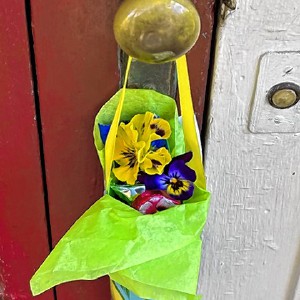 Sharing the gift of spring: The tradition of making May Baskets for May Day
Sharing the gift of spring: The tradition of making May Baskets for May Day Tips for planning a successful garden: Creating a healthy garden is all about maintaining good habits
Tips for planning a successful garden: Creating a healthy garden is all about maintaining good habits Speaking of Nature: Bird of my dreams, it’s you: Spotting a White-tailed Tropicbird on our cruise in Bermuda
Speaking of Nature: Bird of my dreams, it’s you: Spotting a White-tailed Tropicbird on our cruise in Bermuda
